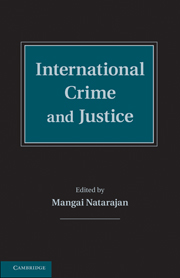Book contents
- Frontmatter
- Contents
- List of Figures
- List of Tables
- List of Contributors
- Foreword
- Preface
- Introduction
- Part I International Criminology
- Part II Law, Punishment, and Crime Control Philosophies of the World
- Part III Transnational Crime
- Part IV Organized Crime and Terrorism
- Part V International crime
- Part VI Delivering International Justice
- 44 The Role of the United Nations
- 45 Treaties and International Law
- 46 International Criminal Tribunals and Hybrid Courts
- 47 The International Criminal Court
- 48 The ICC and the Darfur Investigation
- 49 Victims’ Rights in the International Criminal Court (ICC)
- 50 Nongovernmental Organizations and International Criminal Justice
- 51 Global and Regional Human Rights Commissions
- 52 The Truth and Reconciliation Commission in South Africa
- 53 The Guatemalan Truth Commission
- Part VII International Cooperation and Criminal Justice
- Part VIII International Research and Crime Statistics
- Part IX International research resources
- World Map
- Index
- References
46 - International Criminal Tribunals and Hybrid Courts
Published online by Cambridge University Press: 05 October 2014
- Frontmatter
- Contents
- List of Figures
- List of Tables
- List of Contributors
- Foreword
- Preface
- Introduction
- Part I International Criminology
- Part II Law, Punishment, and Crime Control Philosophies of the World
- Part III Transnational Crime
- Part IV Organized Crime and Terrorism
- Part V International crime
- Part VI Delivering International Justice
- 44 The Role of the United Nations
- 45 Treaties and International Law
- 46 International Criminal Tribunals and Hybrid Courts
- 47 The International Criminal Court
- 48 The ICC and the Darfur Investigation
- 49 Victims’ Rights in the International Criminal Court (ICC)
- 50 Nongovernmental Organizations and International Criminal Justice
- 51 Global and Regional Human Rights Commissions
- 52 The Truth and Reconciliation Commission in South Africa
- 53 The Guatemalan Truth Commission
- Part VII International Cooperation and Criminal Justice
- Part VIII International Research and Crime Statistics
- Part IX International research resources
- World Map
- Index
- References
Summary
INTRODUCTION
International criminal tribunals were created for prosecuting individuals responsible for the grossest violations of international humanitarian law embodied in the Universal Declaration of Human Rights, the International Covenant on Civil and Political Rights, the Hague Conventions, Geneva Conventions, the Genocide Convention, and the Convention against Torture and Cruel, Inhuman and Degrading Treatment and Punishment. This chapter examines the continued development of international tribunals from the Nuremberg and Tokyo Trials to Criminal Tribunal for the former Yugoslavia, Criminal Tribunal for Rwanda, and the hybrid courts including East Timor, Sierra Leone Special Court, and the Cambodian Extraordinary Chambers.
THE NUREMBERG TRIBUNAL
More than sixty million persons, primarily civilians, lost their lives during World War II. The German military was accused of the premeditated murder of civilian populations. After the war, leaders of the Allied nations – United States, France, Great Britain, and the USSR – drafted the Nuremberg Charter creating the International Military Tribunal for the “just and prompt trial and punishment of the major war criminals of the European Axis” powers (Ball, 1999). The Chief Prosecutor was Robert H. Jackson, Associate Justice of the United States Supreme Court. The trial was conducted in Nuremberg, Germany.
- Type
- Chapter
- Information
- International Crime and Justice , pp. 350 - 356Publisher: Cambridge University PressPrint publication year: 2010



